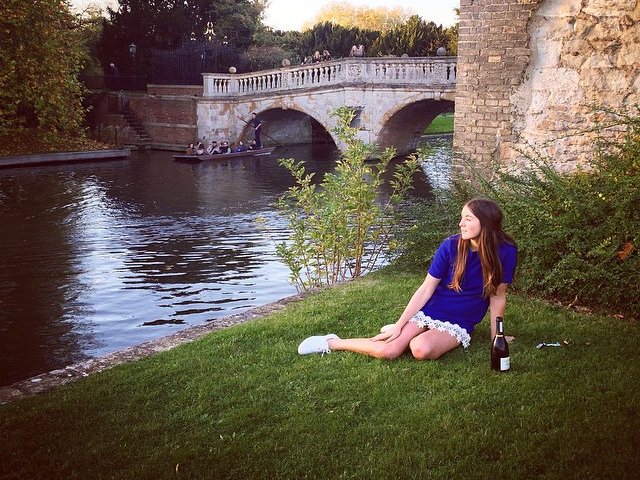Pop Art, A Job as creative, offers you Freedom from Blindness and Drudgery, but tends to free you from benefits and security instead
流行艺术,尽管是一门创造性的工作,能让您避免盲目和乏味,但也有让您脱离福利和安全的倾向
By Jody Rosen
文/乔迪·罗森
For a few days, a couple of weeks ago,
几周前,有好几天,
a small but influential corner of the media world was transfixed by the story of Caroline Calloway and her Creativity Workshop.
媒体圈规模虽小但颇具影响力的一个角落被卡罗琳·卡洛威和她的“创意工厂”的故事震惊了。
Calloway is a 27-year-old with a large Instagram following,
卡洛威是一名27岁的Ins网红,
built by chronicling her time as an undergraduate at the University of Cambridge (picture lolling on the banks of the River Cam)
她走红靠的是在Ins上记录她在剑桥大学的本科生活(懒洋洋地躺在剑河岸边的照片)
and her daily life as a gal-about-town in New York City.
以及她在纽约推荐达人的日常生活。----
Early in January, she announced to her 830,000 followers
1月初,她向她的83万粉丝宣布,
that she would be holding a series of four-hour, $165 seminars in several American cities,
她将在美国的多个城市举办一系列时长四小时,门票165美元的研讨会,
a chance for fans to meet Calloway and imbibe some of her wisdom on “true creative fulfillment.”
届时,粉丝们将有机会见到她本人,并向她取经,学习如何“做成真正有创意的事”。
What followed was a fiasco:
接下来发生的事却异常尴尬:
Early seminars failed to deliver promised amenities,
不仅最初的几场研讨会未能兑现卡洛威之前许诺给粉丝们的那些好处,
and Calloway turned out to have sold tickets to some events without having located venues for them.
而且,有几场活动的门票都已经卖出去了,场地却都还没定下来。

A muckraking Twitter thread materialized, scorning Calloway as a “scammer”;
一个专门爆料的推特帖子出现了,奚落卡洛威是个“骗子”;
she promptly canceled and then uncanceled the tour,
她便立即取消了该行程,之后却又恢复了行程,
all while zapping out flurries of alternately self-flagellating and self-justifying posts on Instagram Stories.
与此同时,她还在Ins上狂发时而自我鞭挞、时而自我辩护的帖子。
As scandals go, this was minor stuff — more opéra bouffe than outrage.
正如那些丑闻中说的那样,这还不算什么——与其说是场愤怒,倒不如说是场轻歌剧。
(“This Instagram Influencer’s Failed Tour Will Satisfy Your Fyre Fest Nostalgia,” cracked a headline on New York magazine’s Intelligencer site.)
(“这位Ins红人‘未能成功的巡回访问’将满足你对Fyre Fest音乐节的怀念,”《纽约》杂志Intelligencer网站的一则头条写道。)
But to many commentators, the episode was a revealing parable of the internet age:
但对许多评论员来说,这一事件堪称互联网时代一个发人深省的寓言故事:
a glimpse of the chaos that lurks behind the immaculately curated feeds of our self-styled lifestyle gurus
它让我们得以窥见我们那些自诩生活达人们精心策划的推送背后隐藏的混乱,
and the hollowness of their advice on, as Calloway put it in the event listing for her seminars,
以及他们,正如卡洛威在她的研讨会的活动清单中所写的那样,
how to “stay connected to your creative self” and “carve out and stick to a creative schedule.”
在如何“与充满创造力的那个自我始终保持联系”,“制定并坚持执行一个充满创造力的时间表”这些问题上给出的建议的空洞本质。
Give Calloway credit for this: In branding herself an oracle of all things creative, she has her finger firmly on the pulse.
通过把自己塑造成一位预言所有创造性事物的先知,她可以说是紧跟着时事动态的。这一点要归功于她自己。
In 2019, “creative” is a juggernaut, a ubiquitous word that touches on all kinds of contemporary aspirations and anxieties.
而2019年,“创意”将成为一股强大的力量,一个无处不在,触及当代各种抱负和焦虑的词。
Businesses employ creative directors to tackle problems with creative solutions.
企业聘请能创造性地解决问题的创意总监。
Politicians intone “creative” with the solemnity they once reserved for such terms as “freedom” and “family.”
政客们用他们曾经专为“自由”和“家庭”等词保留的庄严歌颂“创造性”。
It is a bipartisan bromide: In his November 2016 victory speech, Donald Trump promised to “harness the creative talents of our people.”
这是两党都存在的陈词滥调:2016年11月胜选演讲中,唐纳德·特朗普就承诺“发挥我们人民的创造性才能”。
Two months later, in his farewell address, Barack Obama hailed “this generation coming up — unselfish, altruistic, creative.”
两个月后,奥巴马在他的告别演说中称赞“正在成长的这一代人——慷慨、无私、充满了创造力。”
译文由可可原创,仅供学习交流使用,未经许可请勿转载。



